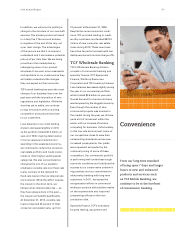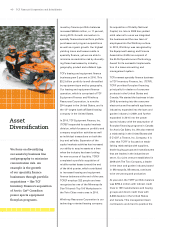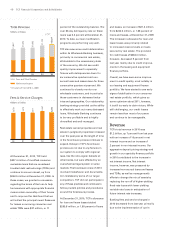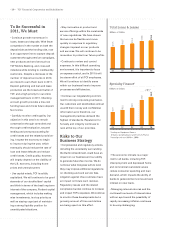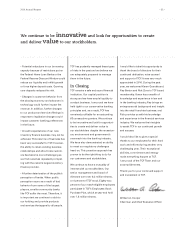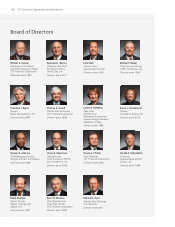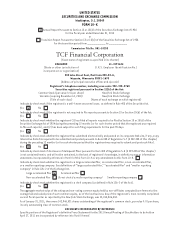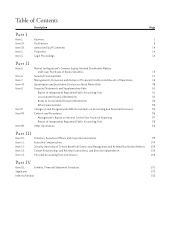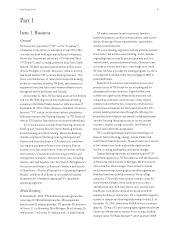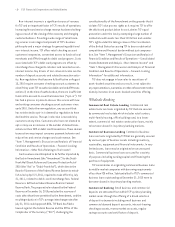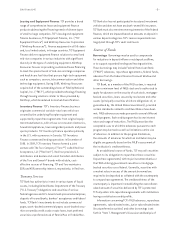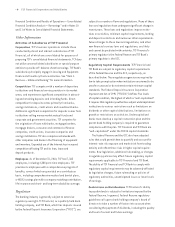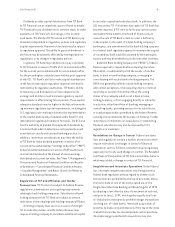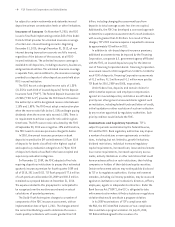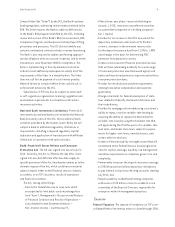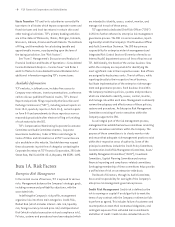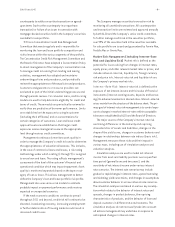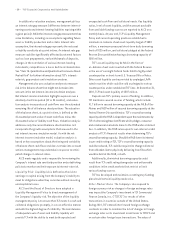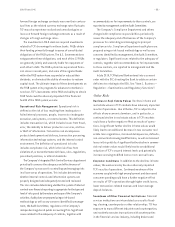TCF Bank 2010 Annual Report Download - page 17
Download and view the complete annual report
Please find page 17 of the 2010 TCF Bank annual report below. You can navigate through the pages in the report by either clicking on the pages listed below, or by using the keyword search tool below to find specific information within the annual report.• 1 •
2010 Form 10-K
Item 1. Business
General
TCF Financial Corporation (“TCF” or the “Company”),
a Delaware Corporation incorporated on April 28, 1987,
is a national bank holding company based in Wayzata,
Minnesota. Its principal subsidiary is TCF National Bank
(“TCF Bank”), which is headquartered in Sioux Falls, South
Dakota. TCF Bank operates bank branches in Minnesota,
Illinois, Michigan, Colorado, Wisconsin, Indiana, Arizona
and South Dakota (TCF’s primary banking markets). TCF’s
focus is on the delivery of retail and commercial banking
products in markets served by TCF Bank, and commercial
equipment loans and leases and inventory finance loans
throughout the United States and Canada.
At December 31, 2010, TCF had total assets of $18.5 billion
and was the 35th largest publicly traded bank holding
company in the United States based on total assets as of
September 30, 2010. Unless otherwise indicated, references
herein to “TCF” include its direct and indirect subsidiaries.
References herein to the “Holding Company” or “TCF Financial”
refer to TCF Financial Corporation on an unconsolidated basis.
TCF’s core businesses include Retail Banking, Wholesale
Banking and Treasury Services. Retail Banking includes
branch banking and retail lending. Wholesale Banking
includes commercial banking, leasing and equipment
finance and inventory finance. TCF refers to its combined
leasing and equipment finance and inventory finance
businesses as Specialty Finance. Treasury Services includes
the Company’s investment and borrowing portfolios and
management of capital, debt and market risks, including
interest-rate and liquidity risks. See “Item 7. Management’s
Discussion and Analysis of Financial Condition and Results
of Operations — Results of Operations — Operating Segment
Results” and Note 24 of Notes to Consolidated Financial
Statements for information regarding TCF’s reportable
operating segments.
Retail Banking
At December 31, 2010, TCF had 442 retail banking branches,
consisting of 198 traditional branches, 234 supermarket
branches and 10 campus branches. TCF operates 201 branches
in Illinois, 111 in Minnesota, 55 in Michigan, 36 in Colorado, 26
in Wisconsin, 7 in Arizona, 5 in Indiana and 1 in South Dakota.
TCF makes consumer loans for personal, family or
household purposes, such as home purchases, debt consoli-
dation, financing of home improvements, automobiles,
vacations and education.
TCF’s retail lending origination activity primarily consists
of consumer real estate secured lending. It also includes
originating loans secured by personal property and, to a
limited extent, unsecured personal loans. Consumer loans
are made on a fixed-term basis or revolving line of credit.
TCF does not have any subprime lending programs nor did it
ever originate 2/28 adjustable-rate mortgages (ARM) or
option ARM loans.
Deposits from consumers and small businesses are a
primary source of TCF’s funds for use in lending and for
other general business purposes. Deposit inflows and
outflows are significantly influenced by economic and
competitive conditions, interest rates, money market
conditions and other factors. Consumer, small business
and commercial deposits are attracted from within TCF’s
primary banking market areas through the offering of a
broad selection of deposit instruments including consumer
interest-bearing checking accounts, money market
accounts, regular savings accounts, certificates of
deposit and retirement savings plans.
TCF’s marketing strategy emphasizes attracting core
deposits held in checking, savings, money market and
certificate of deposit accounts. These accounts are a source
of low-interest cost funds and provide significant fee
income, including banking fees and service charges.
Campus banking represents an important part of TCF’s
Retail Banking business. TCF has alliances with the University
of Minnesota, the University of Michigan, the University of
Illinois and four other colleges. These alliances include
exclusive marketing, naming rights and other agreements.
Branches have been opened on many of these college
campuses. TCF provides multi-purpose campus cards for
many of these colleges. These cards serve as a school
identification card, ATM card, library card, security card,
health care card, phone card and stored value card for
vending machines or similar uses. TCF is ranked 5th largest in
number of campus card banking relationships in the U.S. At
December 31, 2010, there were $264.8 million in campus
deposits. TCF has a 25-year naming rights agreement with the
University of Minnesota to sponsor its on-campus football
stadium called “TCF Bank Stadium®” which opened in 2009.
Part I


